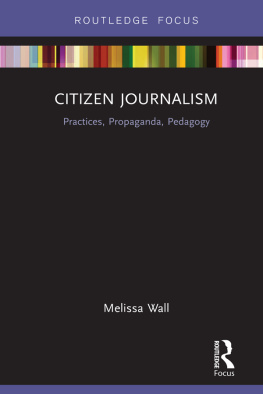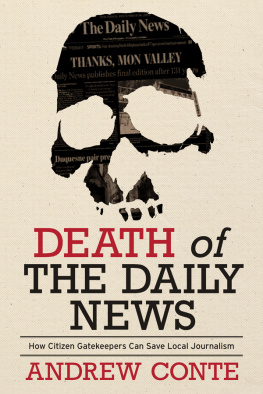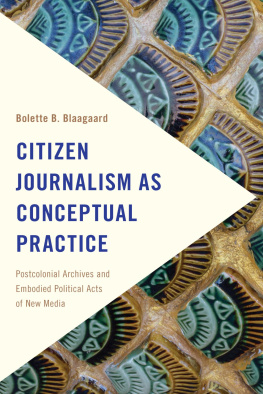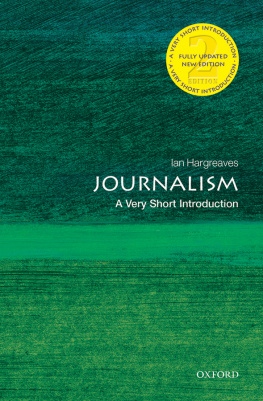Citizen Journalism
Citizen Journalism explores citizen participation in the news as an evolving disruptive practice in digital journalism. This volume moves beyond the debates over the mainstream news media attempts to control and contain citizen journalism to focus attention in a different direction: the peripheries of traditional journalism. Here, more independent forms of citizen journalism, enabled by social media, are creating their own forms of news.
Among the actors at the boundaries of the professional journalism field the book identifies are the engaged citizen journalist and the enraged citizen journalist. The former consists of under-represented voices leading social justice movements, while the latter reflects the views of conservatives and the alt-right, who often view citizen journalism as a performance. Citizen Journalism further explores how non-journalism arenas, such as citizen science, enable ordinary citizens to collect data and become protectors of the environment.
Citizen Journalism serves as an important reminder of the professional fields failure to effectively respond to the changing nature of public communication. These changes have helped to create new spaces for new actors; in such places, traditional as well as upstart forms of journalism negotiate and compete, ultimately aiding the journalism field in creating its future.
Melissa Wall is a professor in the Department of Journalism at California State University, Northridge, USA. She is the author of Citizen Journalism: Valuable, Useless or Dangerous? and founder of the Pop-Up Newsroom.
Disruptions: Studies in Digital Journalism
Series editor: Bob Franklin
Disruptions refers to the radical changes provoked by the affordances of digital technologies that occur at a pace and on a scale that disrupt settled understandings and traditional ways of creating value, interacting and communicating both socially and professionally. The consequences for digital journalism involve far reaching changes to business models, professional practices, roles, ethics, products and even challenges to the accepted definitions and understandings of journalism. For digital journalism studies, the field of academic inquiry which explores and examines digital journalism, disruption results in paradigmatic and tectonic shifts in scholarly concerns. It prompts reconsideration of research methods, theoretical analyses and responses (oppositional and consensual) to such changes, which have been described as being akin to a moment of mind blowing uncertainty.
Routledges new book series, Disruptions: Studies in Digital Journalism, seeks to capture, examine and analyse these moments of exciting and explosive professional and scholarly innovation which characterize developments in the day-to-day practice of journalism in an age of digital media, and which are articulated in the newly emerging academic discipline of digital journalism studies.
Disrupting Journalism Ethics
Stephen J. A. Ward
Social Media Livestreaming
Claudette G. Artwick
Citizen Journalism: Practices, Propaganda, Pedagogy
Melissa Wall
Data Journalism and the Regeneration of News
Alfred Hermida and Mary Lynn Young
www.routledge.com/Disruptions/book-series/DISRUPTDIGJOUR
Citizen Journalism
Practices, Propaganda, Pedagogy
Melissa Wall
First published 2019
by Routledge
2 Park Square, Milton Park, Abingdon, Oxon OX14 4RN
and by Routledge
52 Vanderbilt Avenue, New York, NY 10017
Routledge is an imprint of the Taylor & Francis Group, an informa business
2019 Melissa Wall
The right of Melissa Wall to be identified as author of this work has been asserted by her in accordance with sections 77 and 78 of the Copyright, Designs and Patents Act 1988.
All rights reserved. No part of this book may be reprinted or reproduced or utilised in any form or by any electronic, mechanical, or other means, now known or hereafter invented, including photocopying and recording, or in any information storage or retrieval system, without permission in writing from the publishers.
Trademark notice: Product or corporate names may be trademarks or registered trademarks, and are used only for identification and explanation without intent to infringe.
British Library Cataloguing-in-Publication Data
A catalogue record for this book is available from the British Library
Library of Congress Cataloging-in-Publication Data
Names: Wall, Melissa, author.
Title: Citizen journalism : practices, propaganda, pedagogy / Melissa Wall.
Description: London ; New York, NY : Routledge, 2019. | Series: Disruptions: studies in digital journalism | Includes bibliographical references and index.
Identifiers: LCCN 2018048104 (print) | LCCN 2018056837 (ebook) | ISBN 9781351055703 (ebook) | ISBN 9781138483156 (hardback : alk. paper)
Subjects: LCSH: Citizen journalism. | Online journalism. | Social media.
Classification: LCC PN4784.C615 (ebook) | LCC PN4784.C615 W35 2019 (print) | DDC 070.4/3dc23
LC record available at https://lccn.loc.gov/2018048104
ISBN: 978-1-138-48315-6 (hbk)
ISBN: 978-1-351-05570-3 (ebk)
Typeset in Times New Roman
by Apex CoVantage, LLC
Contents
My understanding of the issues addressed in this volume began with fieldwork at the WTO protests in Seattle, which birthed the Independent Media Center. My thinking was further shaped by the journalists I interviewed as a Fulbright Scholar at Notre Dame University in Lebanon when citizen journalism from the Syrian conflict was just beginning to draw our attention. Likewise, scholars from the Mohyla School of Journalism in Ukraine, where I was an Open Society International Scholar, alerted me to the ways citizen news could be freighted with misinformation and manipulated into propaganda.
I am particularly grateful to the thoughtful guidance of Disruptions Series Editor Bob Franklin, who made this volume possible. A grant from the Mike Curb College of Arts, Media and Communication at California State University Northridge afforded me valuable time to research and write. Journalism Department Chair Linda Bowen provided unwavering support, while Elizabeth Blakey, Stephanie Bluestein and Paromita Pain read drafts of the manuscript. As always, Bronwyn Mauldins unflagging belief in whatever I do was my propellant throughout this process.
They are shooting at us with grenades, grenade launchers, snipers, says a bloodied Oscar Prez, staring into a shaky camera as he films himself. Bangs from weapons shook the screen. Another man off camera somewhere else in the house shouts, We have families we want to see. Prez and six others who wanted to overthrow the Venezuelan government were holed up in a safe house on the outskirts of Caracas in the middle of a shootout with government security forces in early 2018.
A former police officer and one-time action film actor, the blue-eyed, blond Prez was already known to authorities and citizens alike as what the international news media described as a sort of James Bond or Rambo (Lozano, 2017, para. 1; Venezuela Says Rebel Pilot Oscar Perez Killed in Raid, 2018, para. 21). As protests rocked his country in the summer of 2017, Prez had stolen a government helicopter from which he lobbed stun grenades at Venezuelas Supreme Court. Six months later, he and a group of masked men captured a National Guard post and smashed photos of Venezuelas president Nicolas Maduro and former president Hugo Chavez, an action Prez filmed and posted to his YouTube account.







